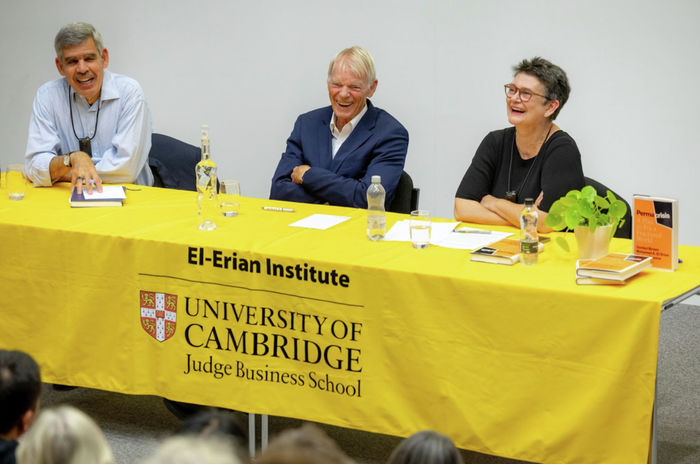Behind the scenes at the Cambridge centre researching new solutions for climate change
Sophie Denny speaks to Dr Shaun Fitzgerald and Dr Antoinette Nestor about their work at the Centre for Climate Repair, COP28 and the future of the climate crisis

On 13 December 2023, COP28 closed with a landmark agreement said to mark the “beginning of the end” for fossil fuels. Dr Shaun Fitzgerald, director of the Centre for Climate Repair in Cambridge, acknowledges that this is “a momentous change”, but reminds me that “it’s taken nigh on 30 years to state the blindingly obvious”. Both he and Dr Antoinette Nestor, the centre’s engagement manager, are keen to note the achievement of bringing “the people and the countries that are oil producing into the conversation”, yet there is still much work to be done.
“There is still much work to be done”
The centre was founded to develop “an integrated, holistic strategy”, tackling the root cause of climate change by coordinating research efforts and “navigat[ing] different pathways” to everyone else. Fitzgerald believes this success comes “from bottom up”. “Political systems are failing us, but I am an eternal optimist, and I don’t think people are failing us.” This approach is what drew Nestor to the campaign, wanting to bring these topics into the everyday so that “people can engage and understand what is happening and why climate repair is important”.
The term ‘climate repair’ is a significant one. While reducing carbon emissions is important, we also need to focus on actively repairing the climate by removing existing emissions from the atmosphere. Emissions reduction is “critically necessary, but not sufficient to stave off the worst effects of climate change”, with the greenhouse gases released until we reach net zero worsening the harmful “insulating blanket” we have already created. “We’ve got to bend the curve on greenhouse gas levels, not just the rate at which we are emitting carbon dioxide.” The need for action is acute, with Fitzgerald recalling a speech from the UN Ambassador for the islands of Palau: “One or two metres of sea level rise for my people is not a case of losing a bit of beach. There is no country left.” “It’s much more than a little bit of beach loss. It’s actually a whole people, a whole way of life,” Nestor adds, telling me that a one-metre rise in sea levels is estimated to cost Bangladesh 20% of its landmass. Climate change is impacting more than just weather systems; it is threatening to destroy entire cultures.
“Climate change is impacting more than just weather systems; it is threatening to destroy entire cultures”
This is why it is vital that we are not “wasting resources on projects that will never see the light of day”. One of the centre’s aims is to refreeze the ice caps, working on research that “could make a real difference, certainly within a period of five years”. Every option has its pros and cons, leading Fitzgerald to believe that “a basket approach is likely going to be the one that society needs to consider”. This will only be achieved through collaboration, something both Fitzgerald and Nestor are optimistic about following their attendance at COP28. It was a “unique experience”, Nestor notes, likening the pass to get into the conference to “the golden ticket” from Charlie and the Chocolate Factory. “Having them [COPs] in person really creates that synergy moment that you cannot really have if they were online,” she says, with Fitzgerald recalling the “open, frank, uncomfortable conversations” they were able to have.
“Everything you do, you do it for the future generations”
These conferences are vital for countries to come together, share knowledge, tackle legal questions and plan for the future. “It’s beholden on us to develop a knowledge base, so that the next generation are not then just left with a blank piece of paper,” Fitzgerald explains. “We are here for good, for the betterment of the world and the betterment of each other […] I do think we will rise to this challenge.” Nestor shares his optimism: “I would say you cannot be pessimistic […] everything you do, you do it for the future generations.”
The importance of the youth has been a recurring theme throughout our conversation, with Fitzgerald believing the older generation “have spectacularly failed”. Both are driven by the possibility of being asked: “What did you do? You could have done something and you didn’t do it,” hence their focus on creating a lasting legacy that can be continued by the youth of today. Nestor reinforces that students’ voices need to be heard: “They can make a difference, no matter what area they work [in], because climate repair is not just science, it’s very broad.” They are emphatic in stating that “everyone can make a difference”. Perhaps we just need to ask ourselves: “What did you do?”
 News / Cambridge academics stand out in King’s 2026 Honours List2 January 2026
News / Cambridge academics stand out in King’s 2026 Honours List2 January 2026 Interviews / You don’t need to peak at Cambridge, says Robin Harding31 December 2025
Interviews / You don’t need to peak at Cambridge, says Robin Harding31 December 2025 Comment / What happened to men at Cambridge?31 December 2025
Comment / What happened to men at Cambridge?31 December 2025 News / Varsity’s biggest stories of 202531 December 2025
News / Varsity’s biggest stories of 202531 December 2025 Features / “It’s a momentary expression of rage”: reforming democracy from Cambridge4 January 2026
Features / “It’s a momentary expression of rage”: reforming democracy from Cambridge4 January 2026










